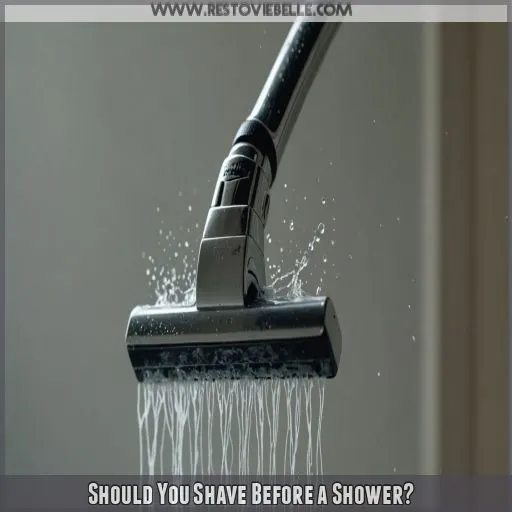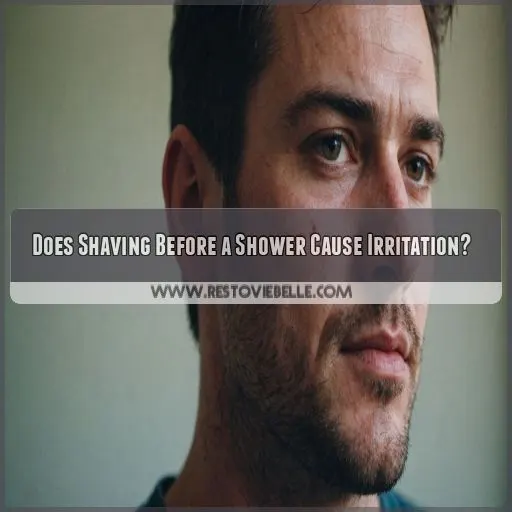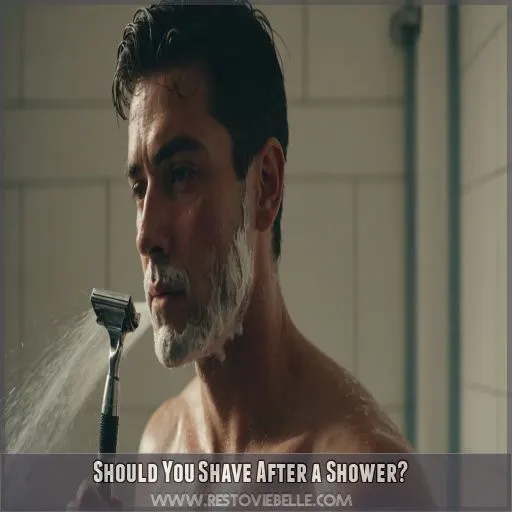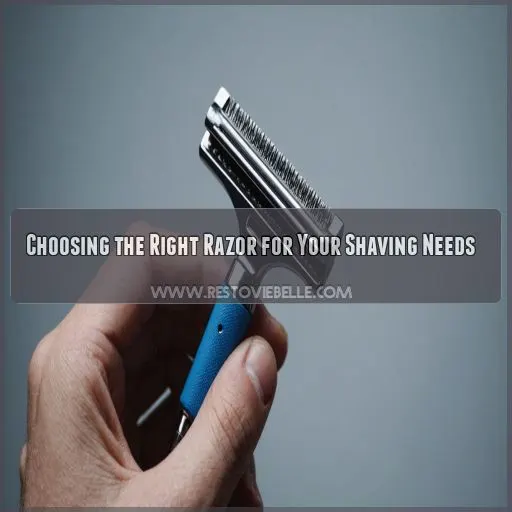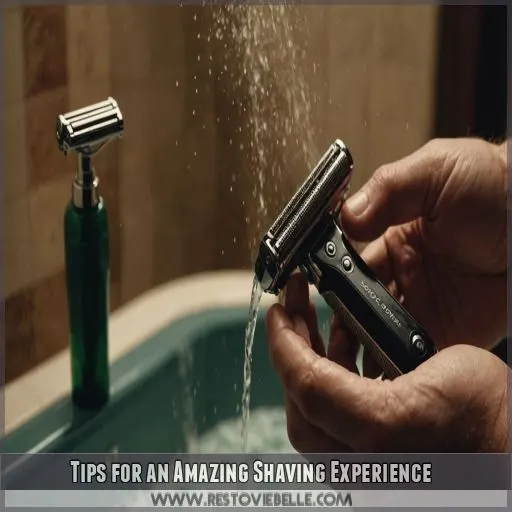This site is supported by our readers. We may earn a commission, at no cost to you, if you purchase through links.
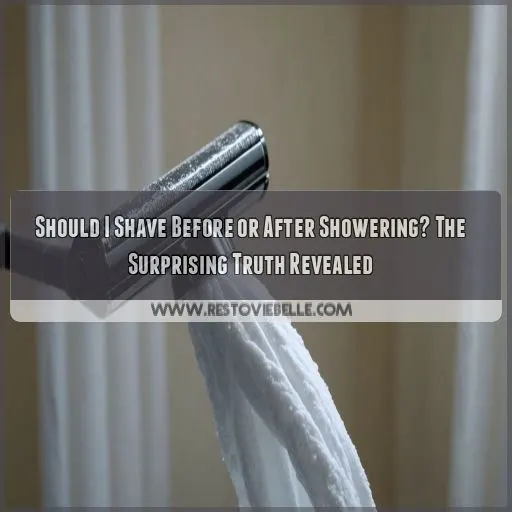
The answer depends on your skin type, hair growth, and personal preferences.
If you’re using an electric shaver or trimmer, shaving before a shower is ideal for easy cleanup.
However, if you’re looking for a smoother shave, doing it after a shower is the way to go.
The warm water softens your hair and opens up your pores, making it a breeze to glide that razor across your skin.
But, there’s more to it than just timing – and we’re about to get into the nitty-gritty details.
Table Of Contents
- Key Takeaways
- Should You Shave Before a Shower?
- Does Shaving Before a Shower Cause Irritation?
- Should You Shave After a Shower?
- What About Shaving During a Shower?
- Choosing the Right Razor for Your Shaving Needs
- Tips for an Amazing Shaving Experience
- Shaving When It’s Best for You
- Frequently Asked Questions (FAQs)
- Is it better to shave before or after shower?
- Should I trim before or after a shower?
- Is it better to wash your legs before or after shaving?
- Can you shave without showering?
- How does shaving impact skins natural moisture barrier long-term?
- What role does exfoliation play in achieving a smoother shave?
- Can shaving at different times affect facial hair regrowth rates?
- How do various water temperatures impact the shaving experience?
- Are there specific shaving techniques for sensitive areas like necklines?
- Conclusion
Key Takeaways
- You’ll want to shave before a shower if you’re using an electric shaver or trimmer – it’s way easier to clean up those stray hairs and shaving cream residue in the shower. Plus, it’s super convenient for a quick shave before hopping in.
- Shaving after a shower is the way to go if you’re looking for a silky-smooth finish – the warm water softens your hair and opens up your pores, making it a breeze to glide that razor across your skin. It’s a total game-changer, especially if you have sensitive skin.
- Don’t even think about shaving without some kind of lubrication – it’s a recipe for disaster. Grab a razor with built-in lubrication or use a pre-shave oil to help your razor glide smoothly across your skin.
- When it comes to shaving, there’s no one-size-fits-all answer – it’s all about experimenting to find what works best for your skin type, hair growth, and personal preferences. So, don’t be afraid to try out different techniques and products until you find your perfect shave.
Should You Shave Before a Shower?
You’re getting ready to shave, but the age-old question pops up: should you shave before or after showering? If you’re using an electric shaver or beard trimmer, shaving before a shower might be the way to go, as these tools work better on dry hair (Source).
What About Trimming Your Facial Hair Before a Shower?
When prepping for a shave, consider trimming your facial hair before a shower, especially if you’re using an electric trimmer or razor for better control.
Pros of Shaving Before a Shower
- Faster prep: Get a quick shave out of the way before hopping in.
- Easier cleanup: Rinse away stray hairs and shaving cream residue in the shower.
- Convenience: Shave on dry skin for a speedy pre-shave prep.
Ideal for Electric Shavers and Beard Trimmers
Shaving before a shower is ideal for electric shavers and beard trimmers, which work best on dry hair for a quick, hassle-free grooming session.
Easy Cleanup of Stray Hairs and Shaving Cream Residue
Shaving before a shower makes cleanup a breeze – simply rinse the bathroom sink or shower drain to banish stray hairs and shaving cream residue.
- Wet wipes can be your best friend for quickly wiping down the sink and surrounding areas.
- A shaving brush helps to contain messes by creating a richer lather.
- Using a safety razor reduces waste and clean-up efforts, a win-win for you and the environment.
Potential Irritation and Recommended Post-Shave Care
Shaving before showering can cause irritation, especially if you have sensitive skin. Use a post-shave balm to soothe and moisturize your skin afterwards, every time.
Does Shaving Before a Shower Cause Irritation?
If you’re shaving before a shower, you might be setting yourself up for some irritation, especially if you’ve got sensitive skin. Shaving on dry skin can be a recipe for discomfort, so you really should follow up with a good post-shave balm to soothe and moisturize your skin.
The Impact of Dry Skin on Shaving
Shaving with dry skin – a recipe for disaster! When you shave before a shower, dry skin can lead to razor burn, ingrown hairs, and irritation. Here are 4 reasons why:
- Increased friction causes razor burn
- Dry skin is more prone to ingrown hairs
- Shaving cream may not lubricate as effectively
- Skin is more sensitive to razor cuts
Recommended Post-Shave Balms for Sensitive Skin
When you’re done shaving, it’s time to soothe your skin! For sensitive skin, choose a post-shave balm with natural ingredients like aloe vera, coconut oil, or shea butter. Here are some options to check out:
| Best Balms | Ingredients to Avoid | Natural Options |
|---|---|---|
| Aloe vera gel | Alcohol, fragrances | Coconut oil, shea butter |
| Chamomile balm | Artificial dyes, parabens | Essential oils (e.g., lavender) |
| DIY balm (coconut oil + shea butter) | Mineral oil, sulfates | Natural moisturizers (e.g., honey) |
Should You Shave After a Shower?
If you’re wondering whether to shave before or after showering, you’re not alone! Shaving after a shower can be a game-changer, especially if you have sensitive skin, as the warm water softens your skin and opens up your pores, making it easier to get a smooth shave.
Does It Take Longer to Shave After a Shower?
Shaving after a shower might take a bit longer, but trust us, the extra time is worth it for the silky-smooth results you’ll get.
Pros of Shaving After a Shower
Shaving after a shower offers several benefits, including softer hair, reduced razor burn, and less irritation, ultimately leading to a closer shave and smoother glide.
- Advantages of shaving after a shower:
- Softer hair makes shaving easier and reduces razor burn.
- Exfoliated skin helps prevent ingrown hairs and bumps.
- A closer shave leaves your skin feeling smoother for longer.
Softer Skin, Opened Pores, and Easier Razor Glide
Shaving after a shower gives you softer skin, opened pores, and easier razor glide – the ultimate shaving trifecta for a silky-smooth finish, every time!
Benefits for Those With Sensitive Skin
If you have sensitive skin, shaving after a shower is a game-changer. Softer skin and opened pores reduce irritation, making it a more comfortable experience.
Using a Razor With Built-in Lubrication
When shaving after showering, using a razor with built-in lubrication can be a game-changer, providing a smoother glide and reducing irritation.
- Some popular razor blade types with built-in lubrication include:
- Gillette razors with Lubrastrip
- Schick razors with Aloe vera strips
- Razors with built-in shaving cream dispensers
- Razors with soothing strips, like chamomile or green tea
- Razors with water-activated lubricating strips
What About Shaving During a Shower?
You’re probably wondering if shaving during a shower is the way to go – after all, who doesn’t love a good multitasking session? Shaving in the shower can be a total game-changer, offering the benefits of warm water and softened skin and hair, but it requires some careful planning to get it just right.
Pros of Shaving During a Shower
Shaving in the shower offers a convenient routine, softened hair, and reduced irritation. With warm water, your razor glides effortlessly, making for easier rinsing and a smoother finish, every time.
Time-Saving Option With Softened Skin and Hair
Shaving in the shower is a genius time-saver! With softened skin and hair, you’ll zip through your shave in no time, making it perfect for busy mornings or quick pick-me-ups.
Importance of Proper Visibility and Lighting
Shaving in the shower? Don’t get steamed up without a clear view! Make sure you have a fog-resistant mirror and adequate lighting to guarantee razor-sharp visibility and shaving safety in the bathroom.
Potential Drawbacks of Poor Visibility
Shaving in the shower with poor visibility? You’re asking for trouble! Missed spots, patchy results, and cuts are just a few accidents waiting to happen – not to mention mirror fogging!
Choosing the Right Razor for Your Shaving Needs
You’re probably thinking, "What’s the big deal about choosing a razor?" Well, the right razor can make all the difference in your shaving experience, and with so many options out there, it’s time to find the one that’s perfect for your skin type and shaving needs.
Considerations for Electric Shavers and Trimmers
When choosing an electric shaver or trimmer, you’ll want to keep a few things in mind: dry vs wet use, skin sensitivity, blade type, and that pesky charging time.
- Dry shaving is ideal for electric shavers, but may irritate sensitive skin
- Trimmer blades can be interchanged for different lengths and styles
- Some electric shavers are designed for wet use, offering a closer shave
- Charging time can range from a few minutes to several hours, so plan ahead
The Importance of Lubrication for a Smoother Shave
For a smooth shave, lubrication is key. Look for razors with built-in lubrication or use a pre-shave oil to help your razor glide effortlessly across your skin.
Experimenting With Different Razors for the Best Results
Now that you know lubrication is key, it’s time to find your perfect razor match. Experiment with different types, like safety razors or disposables, to find the one that glides smoothly for you.
Post-Shave Care for Soothing and Moisturizing the Skin
You’ve conquered the shave, but the real challenge is soothing your skin afterwards! Grab a post-shave balm that’s packed with hydration heroes and irritation fighters to calm the storm.
Tips for an Amazing Shaving Experience
You’re just a few tweaks away from shaving like a pro! To take your shaving game to the next level, try incorporating a pre-shave oil, traditional shaving cream, and a trusty shaving brush into your routine.
Using Pre-Shave Oil for Enhanced Lubrication
Now that you’ve got the right razor, let’s talk prep work! Using a pre-shave oil can be a game-changer. It helps the razor glide smoothly, reduces irritation, and moisturizes your skin. Look for gentle, non-greasy oils like jojoba or argan.
Traditional Shaving Cream for Better Cushion and Lubrication
Upgrade your shave with traditional shaving cream! It provides better cushion and lubrication than pressurized foams, reducing irritation. Look for natural ingredients and apply with a gentle touch for a silky-smooth finish that’ll leave you feeling like a pro.
The Benefits of Using a Shaving Brush
Now that you’re a pro at using traditional shaving cream, let’s talk about the unsung hero of shaving: the brush! A shaving brush helps create a richer lather, exfoliates your skin, reduces irritation, and lifts hairs for a smoother shave.
Shaving When It’s Best for You
You’re about to master the art of shaving at the perfect time for your lifestyle and skin type. Whether you’re a morning shaver or a night owl, finding the best shaving schedule for you’ll make all the difference in getting a smooth, irritation-free shave.
Finding the Best Shaving Schedule for Your Lifestyle
Now that you’ve got the tips for an amazing shaving experience, it’s time to figure out when to shave. Your lifestyle is key – consider your time constraints, daily routine, and personal preferences to find a shaving schedule that works for you.
Considering Your Skin Type and Hair Growth
Your skin type and hair growth are key players in determining the best shaving schedule for you. If you’ve got sensitive skin, shaving less frequently can help reduce razor burn and ingrown hairs – your skin will thank you!
Adjusting Your Shaving Technique for Optimal Results
To adjust your shaving technique for the best results, consider your unique needs. Here are three tweaks to try:
- Shaving frequency: Find your sweet spot to avoid irritation.
- Razor blade angle: Experiment for the closest shave.
- Skin prep: Prep your skin with a warm washcloth.
Frequently Asked Questions (FAQs)
Is it better to shave before or after shower?
You’re wondering when to shave? Shaving after showering is generally better, as warm water softens your skin and hair, making for a smoother glide and less irritation. But, if you’re in a rush, shaving before can work too!
Should I trim before or after a shower?
Time to tame the beast! For trimming, go dry – before your shower. Electric shavers and trimmers work better on dry hair, making it a quick and easy win for a neat, tidy look.
Is it better to wash your legs before or after shaving?
For silky-smooth legs, it’s best to exfoliate and wash them before shaving. This helps remove dead skin cells and dirt, allowing for a closer, more even shave. Give it a try and see the difference!
Can you shave without showering?
You can shave without showering, but it’s a bit of a ‘cut-throat’ move – electric shavers and beard trimmers work better on dry hair, but irritation is more likely, so tread with caution!
How does shaving impact skins natural moisture barrier long-term?
When you shave regularly, you’re basically stripping away your skin’s natural moisture barrier, making it more prone to dryness and irritation over time. Be gentle, and prioritize post-shave care to minimize long-term damage.
What role does exfoliation play in achieving a smoother shave?
Exfoliating before shaving helps remove dead skin cells and other debris that can clog your razor, giving you a smoother shave. Use a gentle exfoliating scrub or a shaving brush to get the job done!
Can shaving at different times affect facial hair regrowth rates?
Shaving at different times won’t affect your facial hair regrowth rates, but it can impact your skin’s comfort level. So, focus on finding a shaving routine that makes your skin happy, not trying to slow down hair growth!
How do various water temperatures impact the shaving experience?
You’re in control! Experiment with warm, cool, and hot water to find your sweet spot. Warm water softens hair, while cool water reduces irritation. Hot water may cause razor burn, so tread carefully.
Are there specific shaving techniques for sensitive areas like necklines?
When shaving sensitive areas like necklines, use a gentle touch and shave with the grain to avoid irritation. Try using a razor with built-in lubrication and a soothing post-shave balm to calm the skin afterwards.
Conclusion
The age-old debate of which came first, the chicken or the egg, has a modern counterpart: should you shave before or after showering?
The answer, like most things in life, is not one-size-fits-all.
It boils down to your skin type, hair growth, and personal preferences.
Ultimately, the best way to figure out what works for you is to experiment.
Your razor will thank you!

